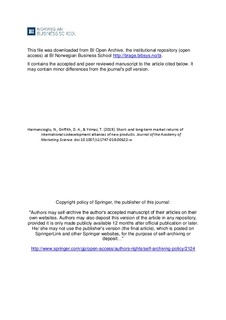Short- and long-term market returns of international codevelopment alliances of new products
Journal article, Peer reviewed
Accepted version
Permanent lenke
http://hdl.handle.net/11250/2598361Utgivelsesdato
2019Metadata
Vis full innførselSamlinger
- Publikasjoner fra CRIStin - BI [1015]
- Scientific articles [2181]
Originalversjon
Journal of the Academy of Marketing Science. 2019, 1 1-21. 10.1007/s11747-018-00622-wSammendrag
Strategic alliances entail process-oriented decisions, in which information about outcomes is unveiled over time. Therefore, it is difficult for investors to gauge the value of such decisions in the short term; longitudinal analysis is necessary. Accordingly, the authors apply latent growth modeling to a data set of 270 international codevelopment alliances announced over an 18-year period. The results demonstrate that investors reward firms for their international codevelopment alliances in the short term but punish them in the long term. Initially, exchange conditions have positive effects, but these effects decrease over time. However, the decrease slows when firms’ market updates contain positive news. Although investors view sharing of innovation resources as a competitive advantage in the short term, they perceive exchange conditions as transaction hazards in the long term. The results also show that long-term decreases in market returns are greater when codevelopment activities are conducted offshore rather than onshore.
